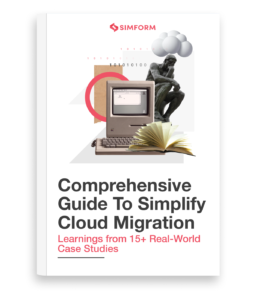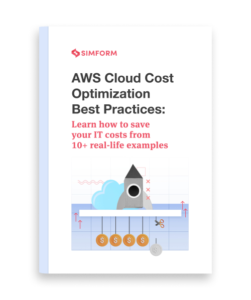“If someone asks me what cloud computing is, I try not to get bogged down with definitions. I tell them that, simply put, cloud computing is a better way to run your business.”
– Marc Benioff, Founder, CEO, and Chairman, of Salesforce, explains it the best.
Cloud computing – One of the most important technologies of our generation, has changed the way the world looks at business.
Gartner predicts that the worldwide end-user spending on public cloud services will be $679 billion in 2024. Yes, you read that right!
Now, three major players control a large part of this multi-billion dollar cloud computing market. They are
- Amazon Web Services (AWS)
- Microsoft Azure
- Google Cloud Platform(GCP)
As a top cloud consulting company, we often get questions from clients like:
- Which is the best cloud computing solution?
- What is the difference between Azure, AWS, and Google Cloud?
- Which cloud computing solution should you select for your business?
- What is the pricing of different cloud solutions?
To answer these and other questions, we compiled all our expertise and experience in this article to help decision-makers select the best cloud platform according to their business requirements.
What is cloud computing?
Cloud computing fundamentally transforms the way businesses access and utilize computing resources. At its core, cloud computing is a model for delivering on-demand services over the internet, eliminating the need for organizations to invest in and maintain physical hardware. Instead of owning and managing servers, storage, databases, and networking equipment, users can leverage the cloud to access these resources as services.
Cloud computing provides a shared pool of computing resources, offering scalability, flexibility, and cost-effectiveness. It essentially empowers businesses to concentrate on their applications and data, leaving the underlying infrastructure to cloud service providers.
Overview of AWS vs Azure vs GCP
AWS (Amazon Web Services), Azure (Microsoft Azure), and GCP (Google Cloud Platform) are the titans of cloud computing, each offering a vast array of services and solutions.
AWS: The Leader in Cloud Services
Amazon Web Services (AWS) stands as the unrivaled leader in cloud services. Renowned for its scalability, AWS caters to diverse needs, from computing power with Amazon EC2 to data storage through Amazon S3. The breadth and depth of AWS services make it a go-to for businesses seeking a robust and mature cloud ecosystem.
Azure: Seamless Integration with the Microsoft Ecosystem
Microsoft Azure emerges as a strong competitor, seamlessly integrating with Microsoft’s vast ecosystem. With a global presence spanning multiple regions, Azure is a preferred choice for enterprises and Fortune 500 companies. Its services, including Azure Virtual Machines and Azure Blob Storage, mirror the familiarity of Microsoft technologies. Azure’s commitment to hybrid cloud solutions further solidifies its standing, offering businesses flexibility in their cloud journey.
GCP: Pioneering Innovation and Analytics
Google Cloud Platform (GCP) distinguishes itself through a focus on innovation and data analytics. GCP’s BigQuery and TensorFlow exemplify its prowess in data processing and machine learning. While having a slightly smaller service catalog compared to AWS and Azure, GCP is lauded for its cutting-edge technologies and commitment to sustainability, making it an attractive choice for organizations pushing the boundaries of technological advancement.
Selecting the ideal cloud provider hinges on specific business requirements. AWS leads in sheer scale and variety, Azure excels in seamless integration within Microsoft environments, and GCP is the trailblazer in innovation. The decision ultimately rests on factors like existing infrastructure, application needs, and strategic goals.
Cloud market share: An Overview
Why is it important to look at the AWS vs. Azure vs. GCP market share?
It will help you understand how seriously cloud platforms take their business.
According to research from the Synergy Research Group, AWS, Azure, and GCP have collectively acquired around 65% of the total market share.
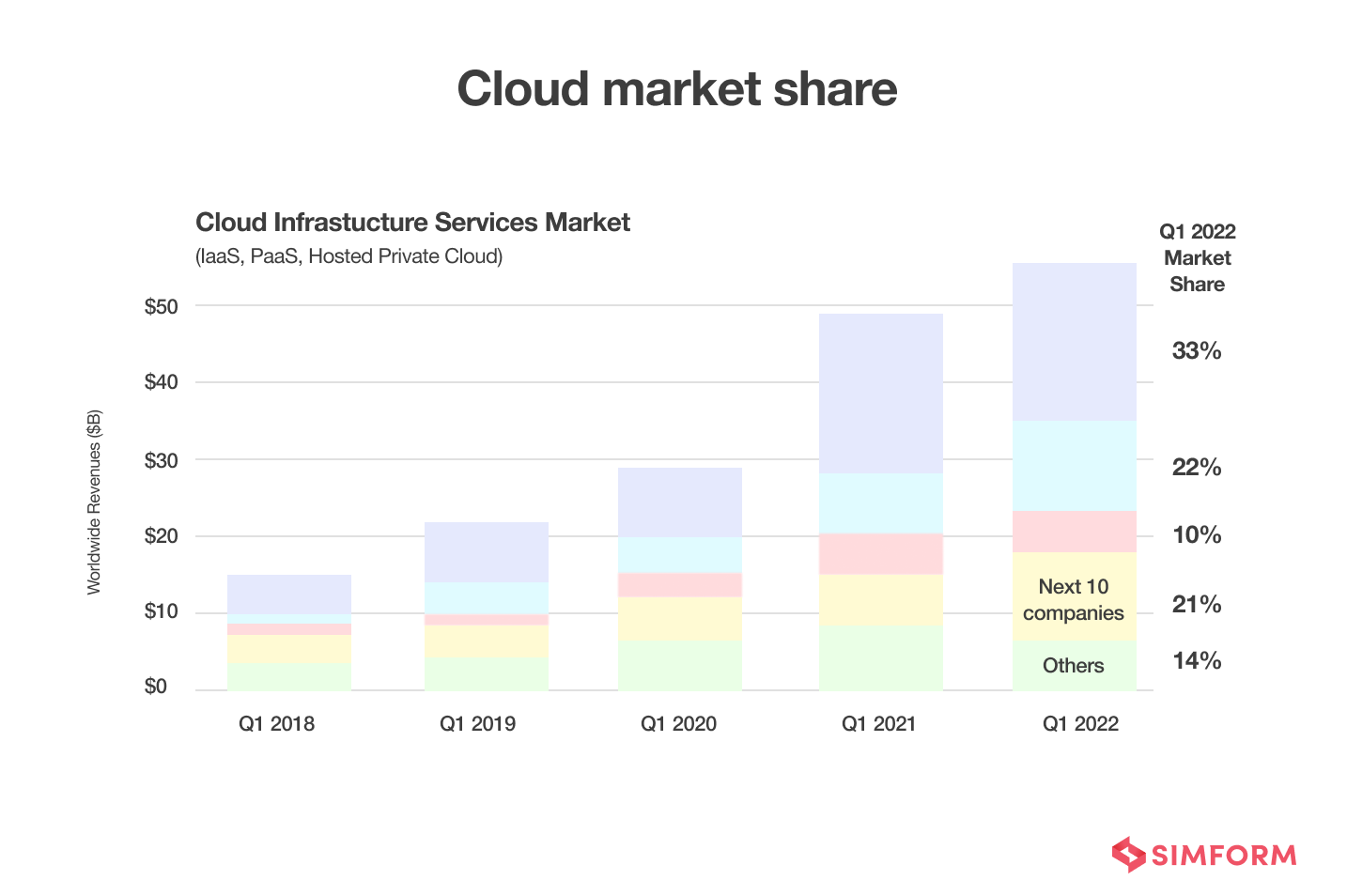
The big three have an even more prolific 71% dominance in services like Infrastructure-as-a-service(IaaS) and platform-as-a-service(PaaS).
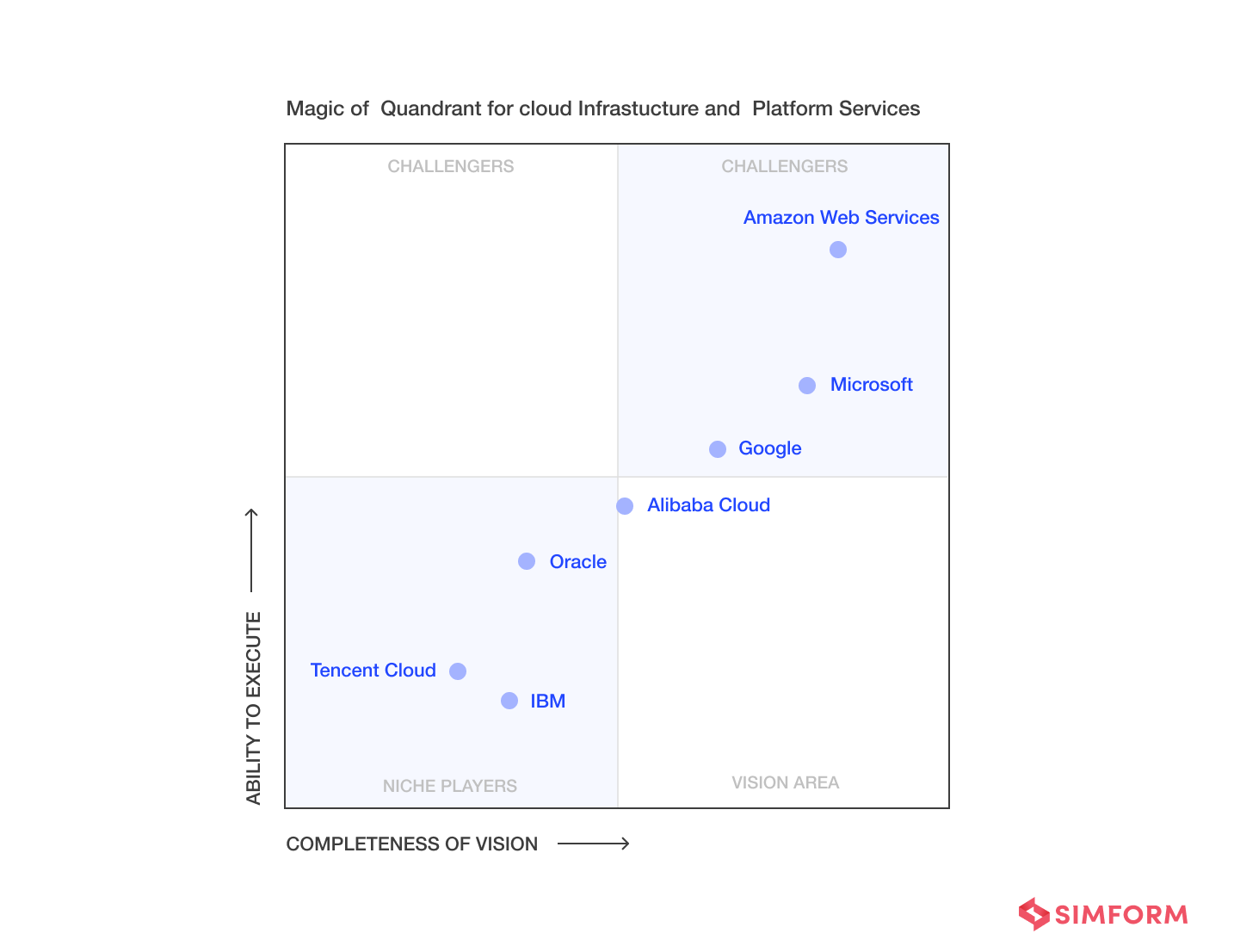
The Gartner magic quadrant for cloud infrastructure and services for 2021 puts AWS ahead of Azure and GCP.
Here are some facts that will tell you how the three cloud majors are serious about their cloud businesses
- Amazon is the oldest cloud service provider, and it currently provides the widest range of cloud services.
- Majority of Fortune 500 companies trust Azure for their cloud requirements.
- Google is going to double its cloud investment in the partner ecosystem in the next few years.
From the above facts, we can see that all three enterprises are determined about their cloud goals, and it is safe to go with any vendor for your cloud project.
AWS, Azure, and GCP: The good, the bad, and the ugly
Every cloud solution has its own set of strengths and weaknesses. To select the best cloud solution for your business, you must briefly understand every cloud solution’s pros and cons. Below is a brief AWS vs. Azure vs. GCP comparison for your reference.
Advantages of AWS vs. Azure vs. GCP: A comparison
| AWS | Azure | GCP |
| More offerings than competitors | Good hybrid cloud support | Cost-effective and simple pricing |
| The oldest player in the market | Easily integrates with other Microsoft products | Leader in AI and ML tools |
| Great data transfer reliability | A robust array of developer tools | Strong integration with Google APIs and Kubernetes |
| Larger talent pool | Wide Geographical coverage | Live virtual machine migration |
| More compute capacity than competitors | ||
| Good documentation |
Disadvantages of AWS vs. Azure vs. GCP: A comparison
| AWS | Azure | GCP |
| Complex costing structure | Poor integration with non-Microsoft products | Smaller global presence |
| Weak hybrid cloud strategy
|
Complex interface | Narrow product range |
| Limited enterprise support |
Now that we have had a look at the advantages and disadvantages of the three cloud service providers, let’s compare them on important parameters.
AWS vs. Azure vs. GCP: Comparison on important parameters
Let’s dig deeper and see a detailed comparison of the three platforms. We have compared the three cloud solutions based on various parameters to enable you to select the most appropriate cloud platform for your business.
Compute
Compute is often one of the first cloud services with which an organization starts its cloud journey.
AWS Computing
Amazon Elastic Compute Cloud or EC2 is the computing service of Amazon. It is compatible with a majority of other Amazon web services.
The auto-scaling monitor of EC2 helps users scale up or down to match their dynamic requirements and is, therefore, a key feature. Moreover, the service also allows the users to choose to pay only for their absolutely necessary computing needs.
AWS has an accelerated compute option which helps in hardware-accelerated processing. It enables AWS to leverage GPUs and provides a storage optimized option for workloads requiring high sequential rates and write access to data sets.
AWS also supports burstable performance instances. The burstable performance option proves to be a cost-effective option for those applications that have low CPU usage.
For those applications that require high performance, AWS offers a compute-optimized virtual machine type. This type of VM has a large amount of memory and can handle heavy loads of applications that process data in memory.
Amazon has its own container service called Amazon Elastic Container Service or ECS. The users can configure the Docker containers as per their requirements. They can also choose to use the pre-configured settings to manage IP address blocking, IAM rules, templates, access logs, and security groups.
AWS provides extensive computing features like:-
- AWS Batch
- Amazon Lightsail
- AWS Beanstalk
- AWS Lambda
- Elastic Load Balancing
- AWS Serverless Application Repository
Azure computing
The Microsoft Azure cloud computing service has a huge network of virtual machines. These virtual machines are based on open-source cloud platforms.
The best part about Azure is its compatibility. Most computing services provided by Azure are compatible with Windows and Linux servers. Apart from this, Azure is also compatible with popular third-party solution providers like SAP and Oracle. A great feature of Azure that lures developers towards the cloud platform is its good support for the hybrid cloud, which is a boon for businesses with diverse requirements.
Azure provides the following compute services:-
- Azure Batch
- Azure IaaS
- Service Fabric
- Azure PaaS
- Azure Spring Cloud
- Azure Functions
Google Cloud Platform Computing
Google Compute Engine, popularly known as GCE, offers many advantages that place it over its competition in cloud services. For example, the GCE helps an organization work with custom and predefined machine types, optimize energy consumption, gain automatic discounts, enjoy Windows and Linux support, and reduce costs through per-second billing.
Moreover, Google has gained expertise in the Kubernetes project through its deep involvement. It offers its customers containers and microservices, providing robust support for Kubernetes and Kubernetes-based services.
Google provides the following compute services:-
- Google Compute Engine
- Google Kubernetes Engine
- Google Cloud Functions
- Google App Engine
AWS vs. Azure vs. GCP: Compute services compared
| Services | GCP | Azure | AWS |
| IaaS |
Google Compute Engine |
Virtual Machines | Amazon Elastic Compute Cloud |
| PaaS | Google App Engine | App Service and Cloud Services | AWS Elastic Beanstalk |
| Containers | Google Kubernetes Engine | Azure Kubernetes Service (AKS) | Amazon Elastic Container Service |
| Serverless Functions | Google Cloud Functions | Azure Functions | AWS Lambda |
Region availability
It’s important to know the region availability of the cloud platforms, especially if you are an international organization with operations in multiple countries. This feature will ensure that your cloud-based system works smoothly in any part of the world. The following are the availability zones for the different cloud service providers.
| AWS | Azure | GCP |
| Asia pacific | Mexico | South America |
| Africa | Brazil | North America |
| Middle East | Chile | Europe |
| Europe | United States | Australia |
| North America | Canada
|
Asia |
| South America |
Multi-cloud support
Many enterprises fear vendor lock-in. The possibility that if an enterprise chooses only one cloud solution provider, it will be locked in with that particular vendor forever is a serious dilemma. Vendor lock-in happens to be the primary reason why enterprises across the globe fear going with cloud service adoption. To address this fear, the big three cloud service providers, AWS, Azure, and GCP provide multi-cloud support.
Microsoft has gained a head start with its well-established Azure stack in the hybrid cloud race. The Microsoft Arc allows Azure users to run the cloud services of Microsoft on GCP and AWS. Azure customers get access to software and hardware required to deploy Azure cloud services from their local data center. In addition, the data center often has a shared management portal, APIs, and code, simplifying the overall interoperability for organizations.
On the other hand, AWS has a service called AWS outposts. Under this service, Amazon delivers pre-configured racks to your physical premise. The outposts make hybrid cloud enablement smoother for its users.
Google’s answer to hybrid cloud is Anthos. Google Anthos brings together Google Kubernetes Engine, Anthos Config Management console, and GKE On-Prem. With Anthos, you can run Kubernetes clusters and other loads on AWS and Azure.
Machine learning
The market size for the machine learning market was valued at $15.44 billion in 2021. The market is expected to grow to $209.91 billion with a CAGR of 39%. Machine learning is making an impact across various industries like manufacturing, entertainment, logistics, and healthcare, to name a few. The ride-sharing app Uber uses ML to determine the price of a ride, minimize the passenger’s waiting time for a ride, and optimally match the passengers in different locations to minimize detours. Machine learning is the future, and the three cloud majors know it. Hence they provide an extensive range of AI and ML services.
| Services | AWS | Azure | GCP |
| Speech to text | Amazon Transcribe | Speech to text | Speech to text |
| Text to speech | Amazon Polly | Text to speech | Text to speech |
| Chatbots | Amazon Lex | Language understanding | Dialogflow |
| Translation | Amazon Translate | Translator | Translation |
| Text Analytics | Amazon Comprehend | Text Analytics | Natural language |
| Image/Video analytics | Amazon Rekognition | Computer Vision Face Indexer | Vision, video |
| Anomaly detection | Amazon Lookout Family Fraud Detector | Metrics Advisor
|
Cloud interface |
| Personalization | Amazon Personalize | Personalizer | Recommendations AI |
Machine learning platforms
The following are the machine learning platforms provided by the three cloud vendors.
| Platform type | AWS | Azure | GCP |
| Guided Model Development | SageMaker Autopilot | Automated ML | AutoML |
| Full ML Workbench | SageMaker Studio | Machine Learning Notebooks | AI Platforms |
| MLOps | SageMaker MLOps | MLOps | Pipelines |
Machine learning hardware
The following is a list of the machine learning hardware provided by the three cloud vendors.
AWS
Custom machine learning processors called AWS Trainium and ASIC Inferential for machine learning inferences.
Azure
Specially tuned virtual machines to handle machine learning work. These virtual machines are based on FPGA(Field-programmable gate array). FPGAs are more power-efficient and can produce the same or more compute power as compared to GPUs.
GCP
GCP provides a machine learning optimized custom TPU(tensor processing unit) to handle machine learning workloads. The benefit of TPUs in machine learning is that as they were specifically designed for neural network loads, the OPUS works much faster and uses much fewer resources as compared to GPUs.
Storage services
Many organizations choose the cloud due to the vast storage capacity that the cloud provides. Cloud storage is cost-efficient for businesses. This is because cloud storage providers distribute their infrastructure costs across their customers.
The scalability of the cloud is another major advantage that comes with cloud storage. With physical data storage devices, it is impossible to scale immediately. However, cloud service providers provide instant storage scalability to their customers. For instance, if you want to increase your storage capacity from 100TB to 120TB instantly, then it is not possible with physical storage devices, but with the cloud, it is a matter of seconds.
Each of the top three cloud service providers offers a huge variety of storage options.
AWS
The Amazon Simple Storage Service(S3) system is the most common type of storage system. However, if the organization requires large block storage, Amazon has Elastic Block Store (EBS).
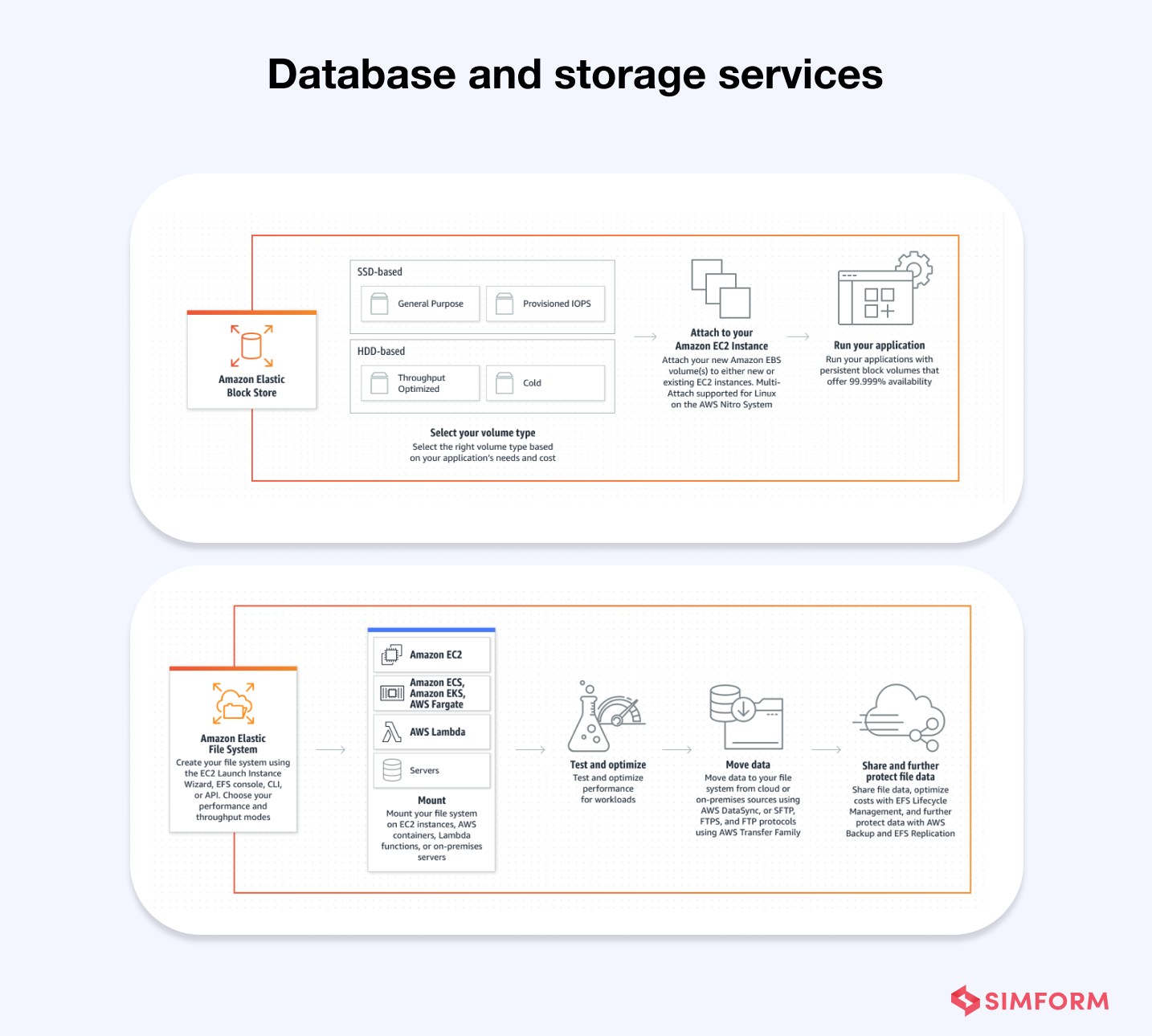
A business can scale its storage capabilities automatically using the Amazon Elastic File Storage solution. Amazon ElastiCache service allows an organization to avail in-memory data storage per its requirements. In addition, AWS has a powerful data migration service that helps organizations ease their transition to AWS. Talking about migration, here are the 11 lessons learned from early adopters of cloud migration.
AWS storage solutions
- Data migration service
- SQL supported databases
- Snowball Edge or Snowmobile storage
- Glacier backup service
- Relational database support
Azure
Azure offers Azure Data Lake Storage and Azure Queue storage for enterprise-level organizations. If the organization needs to store large volumes of unstructured data, then Blob storage is often the ideal solution. On the other hand, Azure File Storage is a fully managed distributed file system that is based on the SMB protocol. The Azure File Storage works something like your typical hard drive. Hence Azure File Storage is suitable for companies that do not need to store a lot of unstructured data, typically small and medium-sized companies.
Use cases for Azure blob storage
- Audio/video streaming
- Distributed access storage
- Data storage for analysis by on-premise Azure-hosted service
Use cases for Azure File Storage
- Supplement on-premise file servers
- Remove the need to maintain Windows File Servers
- Allow global network share access
Azure also offers support for a large number of SQL-based databases. For example, the Azure Server Stretch database allows businesses using the Microsoft SQL server to leverage the power of the hybrid cloud, which is one of the most popular cloud deployment models.
Azure storage solutions
- Archival backup solution
- Azure Data Warehouse
- Azure SQL
- Azure database PostgreSQL, MySQL, and MariaDB.
- Disk storage solution
Google Cloud Platform
Unlike its competitors, GCP does not have comprehensive storage solutions. GCP features both SQL and no-SQL databases.
GCP storage solutions
- An RDS for SQL Server, PostgreSQL, and MySQL.
- A scalable NoSQL database.
- A fully managed NoSQL database service to handle huge volumes of both analytical as well as, operational workloads
- A managed RDS with strong consistency, unlimited scalability, and 99.99% availability
- In-house data transfer service
AWS vs. Azure vs. GCP: Storage services compared
| Services | AWS | Azure | GCP |
| Object Storage | Amazon Simple Storage Service | Blob Storage | Google Cloud Storage |
| Virtual Server Disks | Amazon Elastic Block Store | Managed Disks | Google Compute Engine Persistent Disks |
| Cold Storage | Amazon Glacier | Azure Archive Blob Storage | Google Cloud Storage Nearline |
| File Storage | Amazon Elastic File System | Azure File Storage | ZFS/Avere |
Security
Cloud security is a major concern, especially for organizations that store sensitive data on the cloud infrastructure. According to State of Cloud Security 2021, 98% of organizations have faced at least one cloud data breach during the past 18 months. The report also shows how Cloud security is a serious issue as only 46% of the organizations utilize purpose-built cloud applications. Part of this problem can be attributed to the fact that most organizations have shifted to the cloud in the post-pandemic era. The awareness regarding cloud security is still low in such organizations.
However, all three cloud platforms provide robust cloud security solutions that can safeguard you and your organization from a security breach. The following are the security features provided by the three cloud majors.
| AWS | Azure | GCP |
| Data isolation through firewalls and granular IAM. | Central security system. | Security from privileged access attacks. |
| AWS inspector for vulnerability assessment. | Anti-malware option for malware protection. | Google KMS to manage cryptographic keys. |
| API activity monitoring. | 256-bit AES encryption for Azure keys. | Google IAM for granular access control. |
| Guard Duty for threat intelligence. | Penetration tests to test security measures. | Google cloud security scanner to identify potential threats. |
AWS vs. Azure vs. Google pricing
All three cloud service providers also offer an on-demand per hour, minute, or per-second billing. Pricing also varies widely according to the resources, regions served, and chosen services.
Which free tier is best?
All three cloud platform service providers deliver no-cost tier solutions for their customers. So first, we will look at the free-tier of the three cloud platforms. A majority of organizations start their cloud adoption journey through the free tier.
AWS vs. Azure vs. GCP free tier comparison
| Free tier type | AWS | Azure | GCP |
| 12 months free | Amazon EC2
Amazon S3
Amazon RDS |
Azure Virtual Machine-Linux And Windows
Azure Blob Storage
Azure SQL database |
|
| Trials | Amazon SageMaker
Amazon Redshift
Amazon App stream 2.0 |
Google Kubernetes engine
Compute engine
Firestore
Cloud functions |
|
| Always free | Amazon DynamoDB
AWS Lambda
Amazon SNS |
Azure Cosmos DB
Azure Functions
Azure Event Grid
|
As of now, the AWS free tier is not available in AWS China, and only the Lambda free tier is available in the AWS GovCloud(US) region. Therefore, visit the AWS free tier page to know more about such details.
Unlike AWS, Azure does not provide a trial period. Visit the Azure free services page to know the full list of available services under the 12-month and always free service tier.
Google offers 20+ products, including the Google Compute Engine and cloud storage, free for all of its customers. There are monthly limits, however, in the free tier. Instead of the 12 months offered by its competitors, Google offers its new customers $300 in free credits.
Apart from the regular free credits, those customers who verify their business emails receive additional free credits to explore GCP services.
For a comprehensive list of all the free tier services of GCP, please visit https://cloud.google.com/free.
Cloud cost depends on a lot of factors like
- Network
- Storage
- Data security
- Data backup
- Location
- Data storage
- Transaction fees
The following is a basic comparison of AWS vs. Azure vs. Google Cloud based on two virtual CPUs and 8 GB of RAM. You can refer to our blog on cloud pricing comparison 2022 for more detailed pricing comparison.
AWS vs. Azure vs. GCP cloud cost comparison
| Detail | Amazon AWS | Microsoft Azure | Google GCP |
| Minimum Instance | Two virtual CPUs and 8 GB of Ram –
$69/month |
Two virtual CPUs and 8 GB of Ram-
$70/month |
Two virtual CPUs and 8 GB of Ram-
$52/month |
| Maximum Instance | 3.84 TB Ram, 128 vCPUs-
$3.97/hour |
3.89 TB Ram, 128 v CPUs-
$6.97/hour |
3.75 TB Ram, 160 v CPUs-
$5.32/hour |
| Commitment to avail discount | 1 or 3 years | 1 or 3 years | Committed Use Discount – 1 or 3 years
Sustained Use Discount – no commitment |
| Max. Discount percentage | Up to 75% | Up to 72% | Committed Use Discount – for one year up to 37% or three years up to 55%
Sustained Use Discount – up to 30% |
Now that we have talked about cost comparison, let’s have a look at the popular companies that use AWS, Azure and GCP.
Popular companies associated with AWS, Azure, and GCP
The following is an AWS vs. Azure vs. Google cloud comparison list consisting of the list of big companies who have shifted to the cloud. All three cloud service vendors boast a healthy catalog of high-profile clientele.
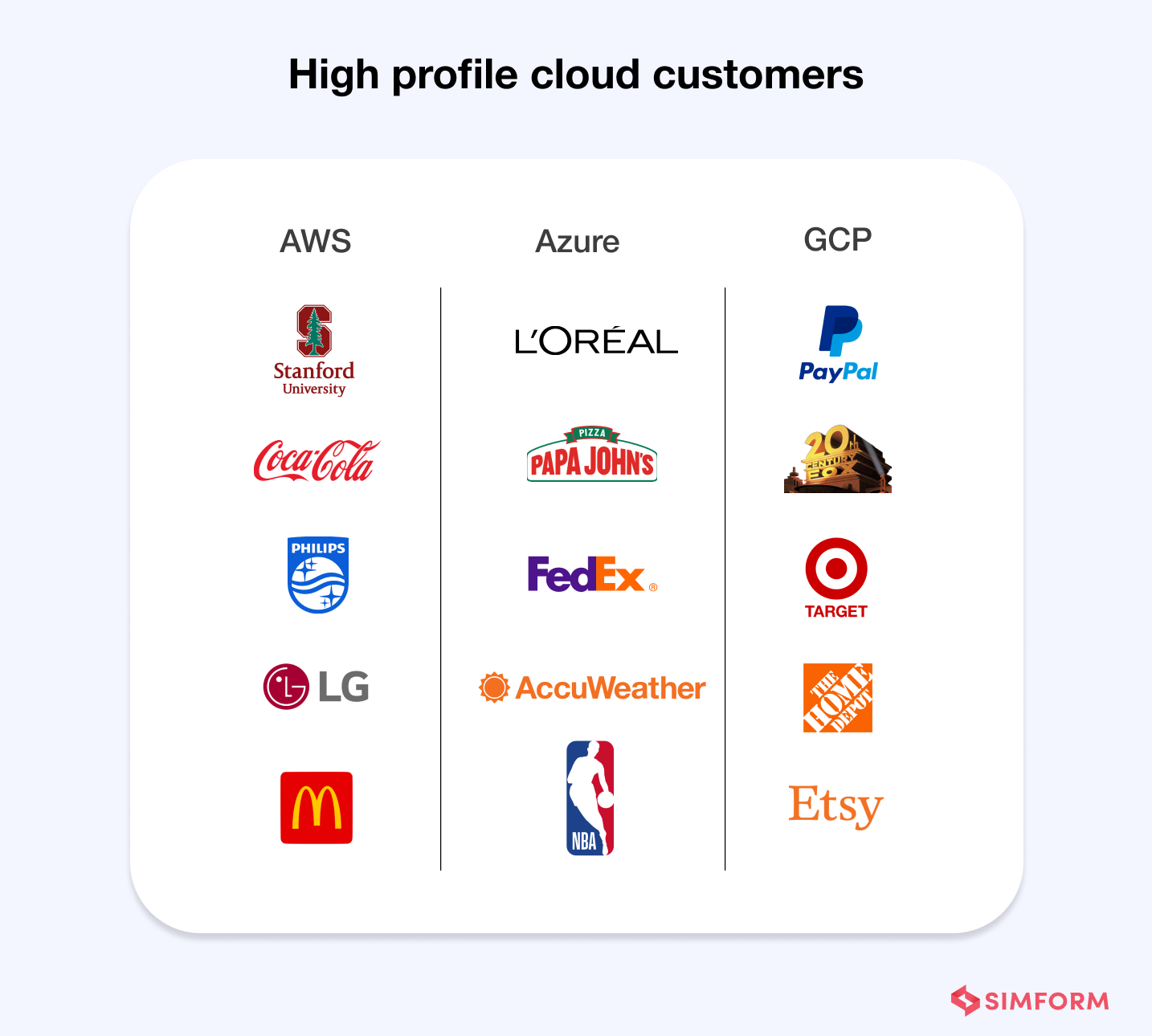
Cloud in action: Real-life examples of cloud
Here are three real-life examples of the cloud offering the best solution for organizations like Paypal, Bosch, and FIH(international hockey federation).
Google Cloud
PayPal was one of the first companies to leverage the power of the cloud in its business. The company partnered with Google as it wanted to build a payments platform that could handle a wide variety of traffic. The user traffic is unstable and hard to predict for payment platforms like PayPal. However, the cloud capability allowed PayPal the required flexibility in handling user load, and now the team need not plan for it in advance. Normally it would take months to add on-premise infrastructure capacity, but with Google Cloud, PayPal could finish the task in hours.
Moving to Google Cloud proved to be a significant cost-saving move for PayPal. With the cloud infrastructure in place, the company need not invest in configuring its own servers during the holiday season to serve the expected extra traffic.
Using Google’s cloud services, the company could also process 1000 payments per second during the Cyber Monday and Black Friday sale period. This impressed the PayPal engineers immensely, who were initially apprehensive about adopting GCP.
AWS
Simform delivered a fully tested and high-quality website for FIH (International Hockey Federation.
Our client required a high-performance website that could handle huge traffic spikes and provide low latency. We at Simform used Amazon EC2 and Amazon CloudFront to fulfill the client’s requirements. As a result, the FIH website was able to cater content to over 100,000 daily visitors. We can even build a scalable application for up to 1 million users using AWS. Our team also used Amazon S3 to store videos and Amazon EC2 to manage videos pf FIH.
Additionally, the Amazon Elastic Transcoder service helps convert FIH video files from the source to a wide range of video formats. We did this to broaden the range of devices on which the FIH videos could run. Our expertise in AWS helped FIH save a significant amount of money compared to a traditional data center.
Azure
Bosch built a digital twin solution that helped the company conduct accurate preventive maintenance of critical rotating machines like wind turbines. It’s the digital avatar of a physical machine, which in this case was a wind turbine. The digital twin lets engineers know when and which area requires maintenance. It helps them conduct timely preventive maintenance, reducing the machine’s downtime. Bosch chose Microsoft Azure for the critical digital twin solution.
The Azure IoT hub makes all relevant data regarding the turbines available to the engineers. This data is, in turn, connected to Power Apps, another Microsoft product. Therefore, whenever an alarm regarding an anomaly is triggered, the digital twin sends the message to the console through Microsoft teams. This message alerts the technicians of that particular machine, signaling them the exact nature of the issue. The technicians are now armed with knowledge regarding the issue of the machine just at the right time. This helps them take appropriate preventive action and avoid the breakdown of the turbine. In case the technicians want any expert help, HoloLens 2 and Remote Assist are available for their assistance.
Owing to the success of the digital twin solution, Microsoft was awarded the Intelligent Manufacturing Award 2021.
Here are 12 examples where organizations used microservices to their advantage.
AWS, Azure, and GCP: Which is best for your business?
All things said and done, do we have a winner in AWS vs. Microsoft Azure vs. Google Cloud battle?
AWS
It is the oldest player in the cloud industry, with probably the widest offerings of cloud services. With AWS, you can avoid cloud deployment’s common risks and pitfalls. It smoothly integrates with a wide variety of third-party services.
However, AWS requires specialists to run properly, and its complicated pricing mechanism isn’t preferred by most people.
AZURE
Azure is an extensive and simple to use cloud solution. The best part about it is its easy integration with a host of Microsoft services. Apart from that, Azure is your go-to solution if you want to have a hybrid cloud infrastructure. More than 95% of fortune 500 clients choose Azure over other cloud service providers, making it the top choice for enterprise clients.
While Azure works like a charm with Microsoft products, the scenario is a bit different in the case of non-Microsoft products. It is difficult to completely customize Azure as it has limited support for non-Microsoft products.
GCP
GCP integrates well with other Google services and has flexible and simple pricing models. It has in-depth containerization and is considered a leader in AI and ML-powered cloud data processing. Being an open-source champion, Google provides GCP users with various customization options.
Unlike its competitors, Google does not provide an extensive array of cloud services. Besides, the number of programming languages compatible with the GCP is also less.
Bottom line
So, in the Amazon AWS vs. Azure vs. Google battle, which one should you choose for your business? The answer: It depends on your business requirements. While all three cloud platforms are exceptional e, some are better than others in certain scenarios.
AWS is best for
Medium to large-scale businesses need a versatile and flexible solution that is easy to customize.
Azure is best for
Large-scale organizations that require a powerful cloud solution backed by a robust Microsoft ecosystem.
GCP is best for
Small scale companies and startups can do with a limited bouquet of cloud services but want many customization options.
AWS vs. Azure vs. Google cloud cheat sheet
Are you fed up with digging the internet for information related to different cloud services provided by AWS, Azure, and GCP? Well, here is a ready reference of the official service pages of the three cloud vendors in this cheat sheet.
| Amazon Web Services | Microsoft Azure | Google Cloud Platform | |
| Regions | Global Infrastructure | Regions | Regions and Zones |
| Pricing | Cloud Services Pricing | Pricing | Pricing |
| Compute | EC2 | Virtual Machines | Compute Engine |
| Serverless | Lambda | Functions | Cloud Functions |
| Containers | ECS
|
AKS
|
Kubernetes Engine |
| Machine Learning | SageMaker
|
Machine Learning | Cloud Machine Learning Engine |
| Cognitive Services | Comprehend
|
Cognitive Services | Cloud Natural Language
|
| IoT | IoT Core | IoT Hub
|
Cloud IoT Core |
| Networking | Direct Connect | Virtual Network | Cloud Interconnect
|
| Content Delivery | CloudFront | CDN | Cloud CDN |
| Big Data Analytics | Athena
|
Stream Analytics
|
Cloud Dataflow
|
| Authentication and Access Management | IAM
|
Active Directory
|
Cloud IAM
|
| Security | GuardDuty
|
Security Center | Cloud DLP
|
| AR & VR | Sumerian | N/A | N/A |
| Virtual Private Cloud | VPC | N/A | Virtual Private Cloud |
| Support | Support | Support | Support |
| 3rd Party Software and Services | Marketplace | Marketplace | Cloud Launcher
|
You can visit the service pages mentioned in the above table in case you have any doubt regarding the service.
Take your business to the next level with Simform!
Irrespective of which cloud services vendor you choose, you will require the help of a top cloud deployment partner to realize the full potential of the cloud. Simform is a top cloud computing company with extensive experience in working on various projects for a diverse set of clients located across the globe. Our cloud experts will decide the best cloud solution out of AWS, Azure, and GCP for your project.
At Simform, we provide a wide range of cloud services like
- Cloud-native app development
- Microservices architecture
- Cloud consulting service
- Cloud migration
- Kubernetes consulting
- Cloud architecture design
- Cloud assessment and cost optimization
We are just a call away and are always eager to help you resolve your business problem using our expertise in the cloud.
FAQS
AWS: Offers features like identity access management (IAM), encryption services, and multi-factor authentication. AWS is designed to maintain data integrity and secure network access.
Azure: Provides security tools such as Azure Active Directory, network security groups, and threat protection. Azure’s infrastructure ensures data is protected both in transit and at rest.
GCP: Includes identity and access management, encryption at rest and in transit, and a secure and private global network. GCP’s security model is built on Google’s experience with securing data and networks at scale.
Migrating applications between these platforms can present compatibility challenges due to differences in underlying architectures, services, and APIs. While tools and services exist to facilitate migration, it often requires careful planning and adjustments to the application.
AWS, Azure, and GCP all offer robust compliance programs covering a wide range of international and industry-specific standards. They provide tools and documentation to help organizations meet their compliance needs, particularly in highly regulated sectors like finance and healthcare.
The “best” cloud provider depends on specific business needs, technical requirements, and existing infrastructure. AWS is renowned for its vast service offering and scalability, Azure for its integration with Microsoft products, and GCP for its data analytics and machine learning capabilities.
Pricing varies based on specific use cases, services, and resources required. AWS, Azure, and GCP all offer competitive pricing models, with costs depending on factors like compute instances, storage needs, and network usage. We recommend assessing the total cost of ownership, including potential discounts and long-term contracts, to determine the most cost-effective option for your specific requirements.
